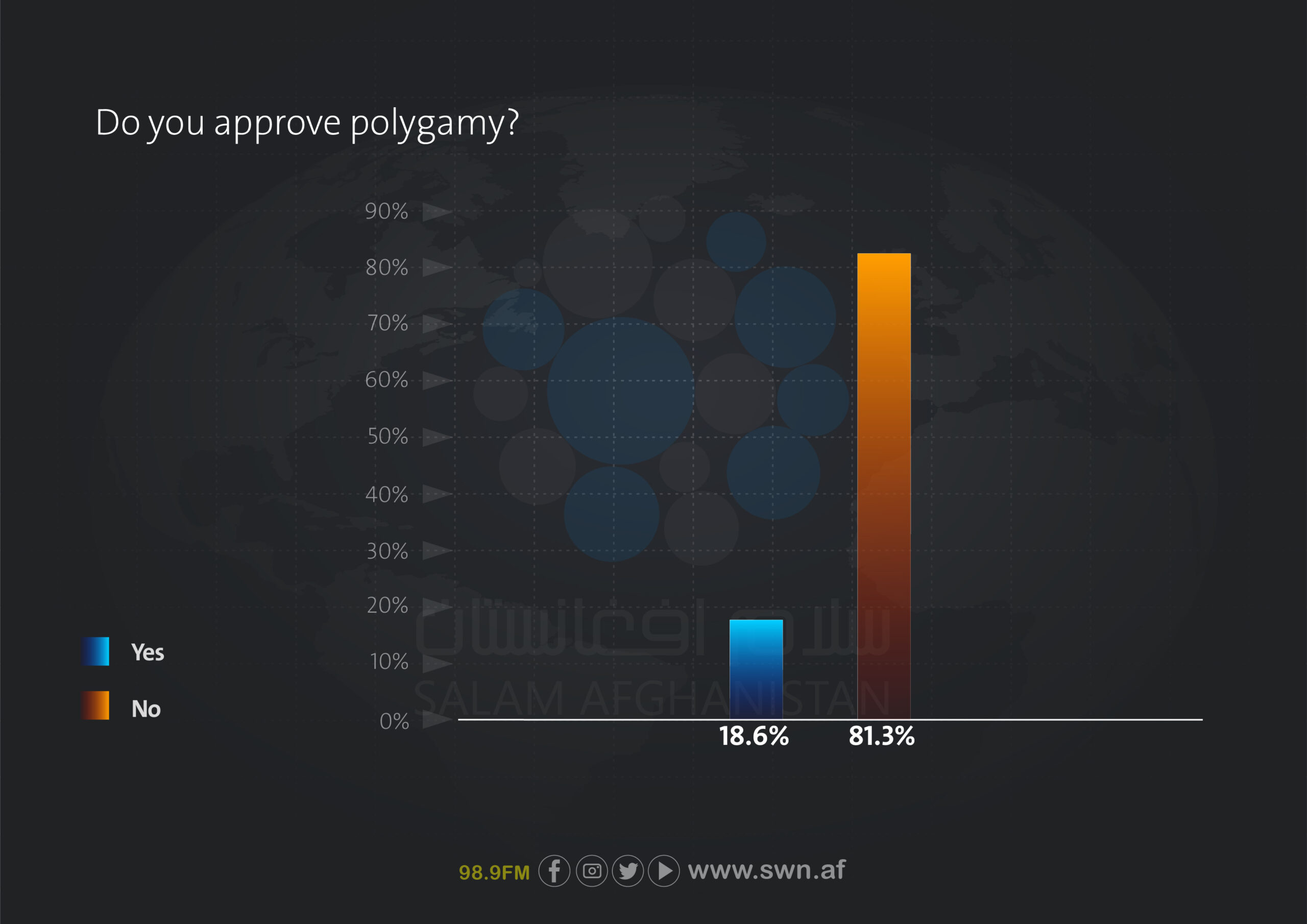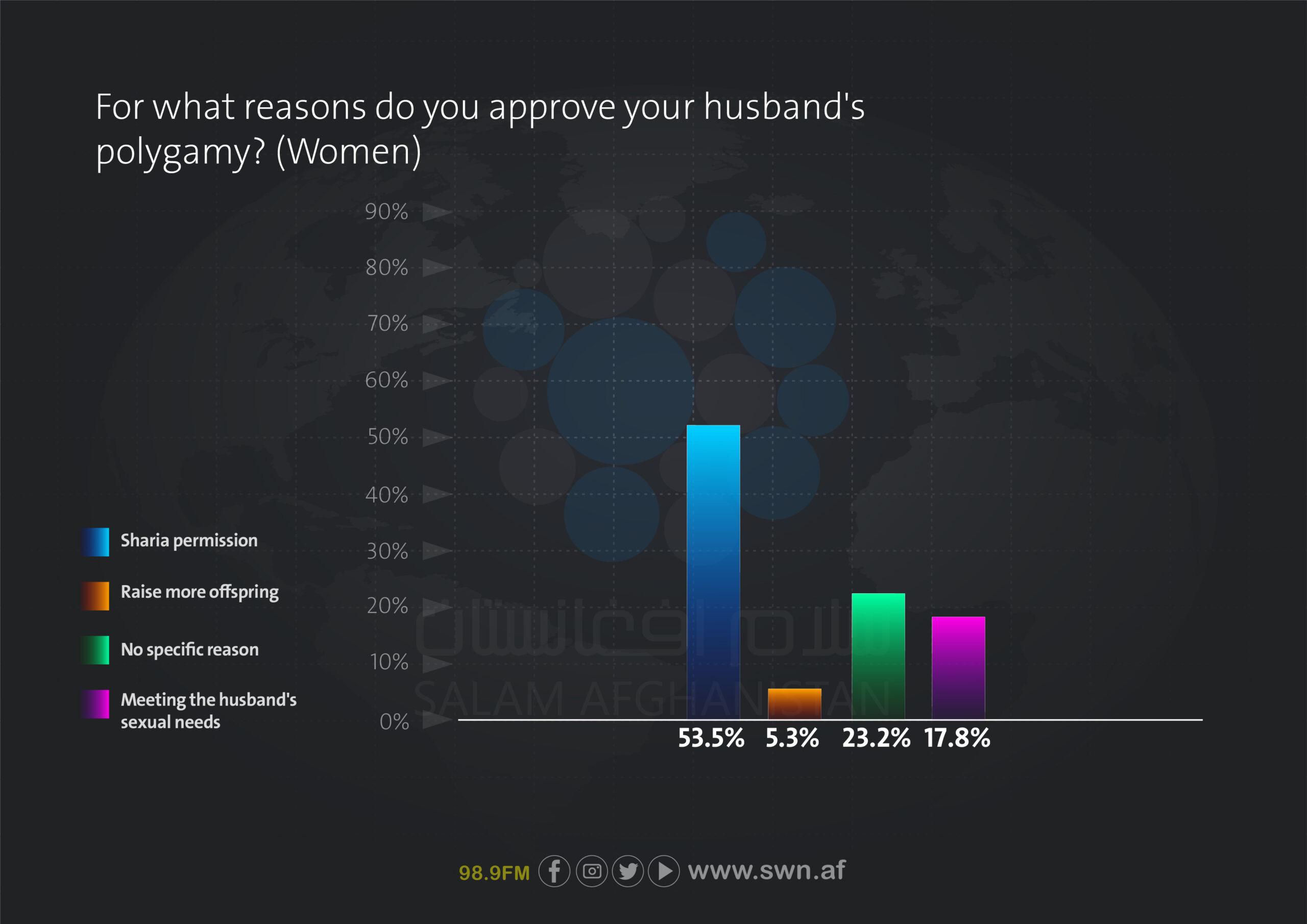KABUL (SW) – In a bid to understand young people’s attitudes toward polygamy, Salam Watandar conducted a survey across 28 provinces of Afghanistan to determine which factors influence their acceptance or rejection of the practice.
Statement
Polygamy has been a traditional practice in many Islamic and traditional societies, including Afghanistan, for centuries, and in some regions, it is still prevalent. However, in recent years, social and cultural changes, along with increased public awareness of women’s rights and gender equality, have shifted perspectives on this phenomenon, particularly among the younger generation.
It appears that the younger generation views polygamy and related concepts differently. While religious and cultural factors continue to play a significant role in traditional societies like Afghanistan, urban youths and educated individuals often oppose polygamy due to reasons such as the inability to ensure fairness among spouses, economic concerns, and a desire for equal relationships.
In this context, there is a need for a deeper understanding of young people’s attitudes toward polygamy. Examining how the youths, especially in urban areas, perceive polygamy can reflect broader social changes in Afghanistan. Therefore, Salam Watandar has conducted a survey across 28 provinces to explore young people’s perspectives on polygamy and to determine which factors influence their acceptance or rejection of the practice.
Data collection and analysis method
This research was conducted over the span of a little more than one month by utilizing a survey with both open-ended and closed-ended questions. The results were analyzed both quantitatively and qualitatively.
Objectives
- Identifying young people’s attitudes toward polygamy.
- Examining gender and regional differences in attitudes toward polygamy, particularly between men and women in urban and rural areas.
- Analyzing the impact of modern social and cultural factors such as gender equality, fairness among spouses, and economic concerns that influence attitudes towards polygamy.
- Understanding the reasons behind support and opposition to polygamy among different segments of the population.
Background
Polygamy has consistently been a contentious issue in Afghanistan; however, a comprehensive study focusing on the perspectives of young people regarding this topic has yet to be conducted. Despite the significance of this issue in Afghan society, most research and reports have broadly addressed family and women’s rights without delving deeply into polygamy specifically.
Notably, Salam Watandar conducted an exclusive interview with 19 women on September 28, 2023. These interviews were with women whose husbands had additional wives, aiming to reflect their views. The findings from these discussions revealed that the majority of these women were dissatisfied and disheartened by polygamy, noting its negative impact on their personal lives and mental well-being. Many complained about the lack of fairness among spouses and increased psychological stress.
Although this effort by Salam Watandar was a significant step in highlighting the issues faced by women with polygamous husbands, there has been no extensive and comprehensive research covering the broader social and cultural dimensions of polygamy. The current study provides a more in-depth exploration of polygamy in Afghanistan and will be valuable for social organizations, policymakers, and researchers seeking to understand and address the complexities of this phenomenon.
Summary report
Salam Watandar conducted a survey across 28 provinces to assess young people’s attitudes toward polygamy. The survey reveals that 81.3% of participants disapprove of polygamy. The survey was evenly distributed between men and women, with the highest number of participants from Kapisa and the lowest from Nuristan.
The findings indicate a significant disparity in attitudes between urban and rural youths. Specifically, 87.9% of urban youths and 64% of rural youths oppose polygamy. Among women, 86% disapprove of polygamy, compared to 76.7% of men. The main reasons for opposition include the lack of desire for polygamy and the inability to ensure fairness among spouses.
Among those who approved polygamy, men are more likely to cite financial and religious reasons, whereas women accept it due to religious justifications for their husbands. The survey highlights the diverse impact of religious, financial, and social factors on young people’s views on polygamy.
Participants, aged between 15 and 35, are primarily from Generation Z, born between the mid-1990s and early 2010s. This generation, characterized by greater awareness of social issues, human rights, gender equality, and a desire for independence and equal relationships, generally rejects polygamy. They view the practice as inconsistent with their modern values and express concerns about economic implications and commitment to shared life, contributing to their disinterest in polygamy.
General report
Salam Watandar conducted a survey across 28 provinces to explore young people’s attitudes toward polygamy. The results reveal that 81.3% of young people are opposed to polygamy.
In the survey, Kapisa had the highest participation rate at 13.3%, while Nuristan had the lowest at 0.1%.

Participants were from various age groups, with 41.5% being between 20 and 25 years old, and 23.8% between 25 and 30 years old.

The educational background of the participants was also assessed as 42% had a bachelor’s degree, 19.3% were university students, 14.2% had completed 12th grade, 2% held a master’s degree, 1.4% were doctorate, and 10.4% were illiterate.

The survey was evenly distributed between men and women.

The survey also examined living conditions, showing that 72.5% of participants were urban dwellers, while 27.5% were from rural areas.

Among youths from cities, 45.5% were men and 54.5% were women.

In rural areas, 61.8% were men and 38.1% were women.

The survey’s results reveal that a significant 81.3% of young people are against polygamy.

The survey results indicate that urban youths are more likely to oppose polygamy than their rural counterparts. Specifically, 87.9% of urban youths and 64% of rural youths disapprove of polygamy.

The survey also differentiated responses by gender. It asked women whether they agreed with their husbands having additional wives and queried men about their inclination towards polygamy. The results showed that 76.7% of men and 86% of women reject polygamous arrangements.

Reasons for rejecting polygamy were also explored. Among men, 56.3% cited the inability to ensure fairness among spouses as the primary reason for rejecting polygamy. Additionally, 18.5% preferred monogamy, 12.3% rejected it without a specific reason, and another 12.3% were deterred by negative experiences of men who had multiple wives.

On the other hand, among men who accepted polygamy, 50.5% were motivated by financial capability, 20.4% sought to increase their offspring, 16.1% had no specific reason, and 12.9% viewed it as a way to meet sexual needs.

Among the 344 women who opposed their husbands’ polygamy, 35.4% believed that men cannot adequately meet the material and emotional needs of multiple wives. 27.3% were influenced by negative experiences from others’ polygamous lives, 20.6% were concerned about a decrease in their husband’s affection, and 16.5% had no specific reasons for their disapproval.

Meanwhile, among the 56 women who accepted their husbands’ polygamy, 53.5% did so due to its permissibility in Islam. 23.2% accepted it without a specific reason, 17.8% were in favor due to sexual and physical reasons, and 5.3% accepted it for the purpose of increasing offspring.

Conclusion
The survey results indicate that the majority of young people in Afghanistan, particularly in urban areas and among women, disapprove of polygamy. This perspective reflects significant changes in the younger generation’s views on traditional practices, influenced by modern social issues, gender equality, and the need for fairness among spouses. While some men continue to favor polygamy for financial and religious reasons, most young people, especially in cities, reject it due to concerns about fairness, negative experiences of others, and a preference for monogamy.
The findings of the survey reveal that Generation Z, which is more influenced by modern values and demands for equality, is shifting its attitude toward polygamy. This shift is important for policymakers and social organizations as it reflects broader changes in family and social values in Afghan society.
Recommendations
- Review and reform family and women’s rights laws: Afghan civil laws related to family and women’s rights should be revisited to ensure greater attention to gender equality and fairness among spouses. Polygamy should be regulated according to clear principles and legal guidelines to address concerns about justice and equity.
- Conduct comprehensive and more in-depth research on polygamy: The research especially in rural areas, should be undertaken to thoroughly examine the various dimensions and influencing factors of this practice. Such research can provide a clearer understanding of the social dynamics and contribute to more effective policy-making.






